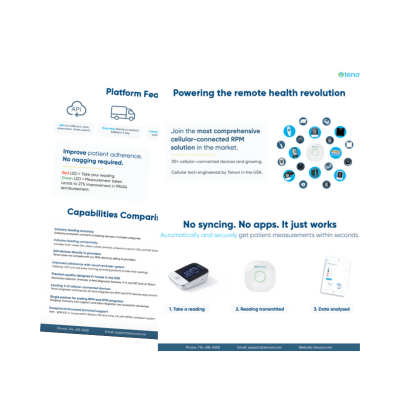On November 2, 2023, in the 2024 final rule for the physician fee schedule, the Centers for Medicare & Medicaid Services (CMS) finalized crucial policies impacting remote physiologic monitoring (RPM) and remote therapeutic monitoring (RTM) services reimbursed under the Medicare program. This article breaks down the key takeaways of the Medicare final rule 2024 to guide companies through the changes and clarifications.
Medicare Final Rule 2024: RPM Exclusive to Established Patients
The Medicare final rule 2024 emphasizes that RPM services can only be furnished to “established patients.” This distinction, reinstated after the Public Health Emergency (PHE), requires patients who started RPM services during the PHE to become “established patients.” Those initiating RPM services after May 11, 2023, must undergo an initial evaluation to qualify.
This re-establishment of the “established patient” requirement aims to maintain a structured approach to RPM services, ensuring a foundation of familiarity with the patient’s health history and treatment plan.
RTM’s Unique Position
In contrast, RTM services offer flexibility and do not mandate an “established patient” requirement. While an initial interaction evaluation is advisable, the Medicare final rule 2024 clarifies that an established patient relationship is not expressly required for RTM services, with potential future rulemaking to address nuances.
This flexibility in RTM requirements allows practitioners to adapt their approach based on the unique needs of patients, potentially streamlining the onboarding process for remote therapeutic monitoring.
Medicare Final Rule 2024 Billing for RPM and RTM
In the Medicare final rule 2024, CMS clarified that certain remote monitoring codes necessitate at least 16 days of data collection in 30 days. Treatment management codes (99457, 99458, 98980, and 98981) do not adhere to the 16-day requirement, offering practitioners greater flexibility.
This clarification on data collection requirements ensures practitioners understand the expectations for different remote monitoring codes. It also addresses concerns raised during the rulemaking process about the potential burden of a uniform 16-day requirement across all codes.
In a given 30-day period, only one practitioner can bill RPM/RTM services for a patient, even with multiple medical devices. This clarity ensures streamlined billing processes while aligning with CMS’s emphasis on reasonable and necessary services.
In the Medicare final rule 2024, the emphasis on singular practitioner billing aims to avoid confusion and potential overlapping claims, ensuring that one healthcare professional coordinates each patient’s remote monitoring services.
Billing RTM for Assistants Under General Supervision
Physical therapists (PTs) and occupational therapists (OTs) can now bill Medicare for RTM services according to the Medicare final rule 2024. This includes those provided by their assistants (PTAs and OTAs), with the requirement of general supervision. The change facilitates broader access to RTM services within private practice settings.
These expanded billing capabilities for PTs and OTs underscore the importance of incorporating a diverse range of healthcare professionals in the delivery of remote therapeutic monitoring. It recognizes the collaborative nature of healthcare and the contributions of various team members.
Concurrent Billing with Care Management Services
According to the Medicare final rule 2024, practitioners can bill Medicare for RPM or RTM concurrently with certain care management services, avoiding double counting of time and effort. This strategic approach allows practitioners to tailor patient care management services without compromising compliance.
The ability to concurrently bill for remote monitoring and other care management services reflects CMS’s commitment to providing comprehensive and coordinated healthcare. It encourages practitioners to leverage a combination of services to meet the diverse needs of patients.
Global Surgery Period in the Medicare Final Rule 2024
Billing practitioners cannot bill Medicare for RPM or RTM services during global surgery periods. However, practitioners not receiving global service payments, such as therapists, can provide these services during the global period, ensuring flexibility in patient care.
This distinction in billing practices during global surgery periods aims to balance the financial considerations for practitioners while focusing on patient care continuity. It encourages healthcare providers to adapt their billing strategies based on their specific patient treatment roles.
Separate Reimbursement: FQHCs and RHCs
Starting January 1, 2024, Federally Qualified Health Centers (FQHCs) and Rural Health Clinics (RHCs) can separately bill Medicare for RPM and RTM services, departing from the previous all-inclusive rate model. This change aims to enhance reimbursement and align with coding requirements.
The shift towards separate reimbursement for FQHCs and RHCs reflects a recognition of the unique challenges and services provided by these healthcare entities. It offers financial flexibility and acknowledges its role in delivering remote monitoring services to Medicare beneficiaries.
RPM Exclusion from MSSP Primary Care Services
While CMS considered including RPM CPT codes in the Medicare final rule 2024, the definition of primary care services for the Medicare Shared Savings Program (MSSP) ultimately chose not to. The concern lies in potential conflicts when specialists also bill RPM codes, affecting the assignment of primary care services under MSSP rules.
This decision reflects CMS’s commitment to maintaining the integrity of primary care services within the MSSP framework. By excluding RPM codes from the definition, CMS aims to prevent potential disruptions in assigning primary care services and ensure accurate representation in the program.
Understanding the Medicare Final Rule 2024
The Medicare final rule 2024 marks a milestone in the evolution of RPM and RTM Medicare billing. Despite increased clarity, some operational uncertainties persist, emphasizing the need for stakeholder engagement in future rulemaking to enhance the utilization of these services in advancing digital health models for patients.
We hope you have found these key takeaways helpful in further understanding the nuances within the Medicare Final Rule 2024. As healthcare providers navigate the evolving landscape of remote patient monitoring and therapeutic services, staying informed and actively participating in future rulemaking processes will be essential for optimizing patient care and compliance with CMS guidelines.


